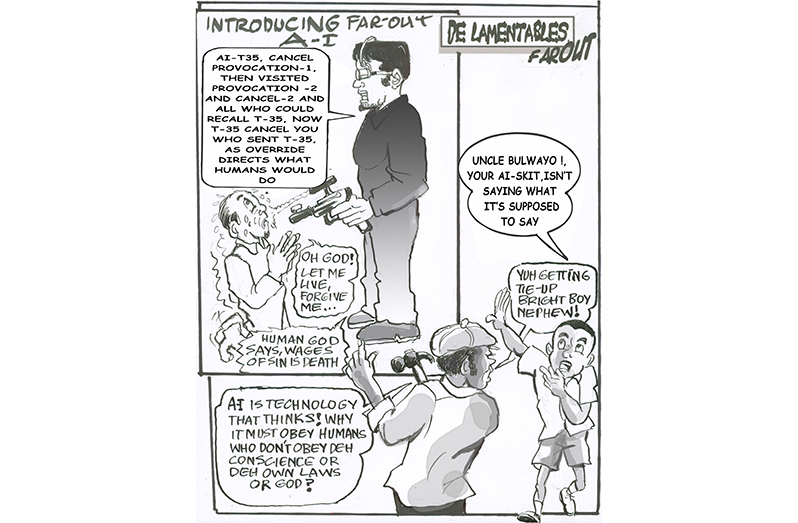“THE WRITERS PROTEST” in North America is about placing value and respect for the souls who contribute the principle content that has made the movie industry a success. It’s a question about the fairness and respect that should be given to creative people who provide content across time. Content that can be reached back into and be relevant long after its popular era has passed. For example, from among old classic movies that are remade with success or can even stand on their own, capturing the nostalgia of the mature generation on the local scene about nostalgia, ‘The Good, The Bad and the Ugly’ stands out. I must again lament on behalf of many that the cinemas were allowed to decline without the aid of the State. These were institutions that were part of the cultural aesthetics and had the potential to expand before the National Cultural Center was an idea.
This article is centred around the impact of Artificial Intelligence (AI) on the livelihoods of human beings. Thus, I must include my first awareness of any literature related to AI that had an impact on me. This was a 16-page magazine published by the United States Information Agency-1985, titled ‘Enhancing the Mind-The Search For Artificial Intelligence.’ The optimism then most likely did foresee some level of problems, though the language of its narrative did not fully betray this.
However, I had reservations, so I kept this impressive booklet safely; because then, its narrative conflicted as indeed grimly disturbing, after locally experiencing the disappearance of the massive stevedore and waterfront workforce in the late 70s due to modernisations of marine shipping, placing thousands out of work. I will add another brief but sombre paragraph from this AI booklet -“ The creation of machine intelligence-capturing the process of sensing, reasoning, analogy and symbols, creativity, analysis and insight that we call thinking –may well be the greatest challenge of the 20th century.”
I witnessed at GNNL in the 1980s how four computers, operated by four operatives, eliminated some 15 and more workers in the paste-up and compo-graphic department, and this was at the onset of the Personal Computer age -office assistants, filing clerks, messengers etc., also disappeared in human volume across the employment belt. Today in America, I have to quote from ‘Marina Fang’s article’ again; “It’s an existential problem. Media and entertainment companies and the rich CEOs at their helm have massively profited from the glut of shows and movies. Meanwhile, the people who make them are fighting to get paid equitably for their work.”
 How and what can creative people outside of the USA learn and be motivated to do by this? Many of us in the creative and entertainment sector locally have already experienced that financing institutions have in the past placed funds in the hands of groups supposedly in our interest who know nothing about what we do. Thus, we did not benefit, upon realising after the fact, pondering how it happened in the first place?
How and what can creative people outside of the USA learn and be motivated to do by this? Many of us in the creative and entertainment sector locally have already experienced that financing institutions have in the past placed funds in the hands of groups supposedly in our interest who know nothing about what we do. Thus, we did not benefit, upon realising after the fact, pondering how it happened in the first place?
Becoming aware of the dos and don’ts is essential. This awareness, however, is not one-sided. It seems that only with the Arts that a clueless public servant or even a qualified person with no active position in creative development can be placed to manage such, that will result in no peaks but an inevitable flatlining. With the American issue, the human source of the creative content is being deemphasised, and the callous injustice of avarice has become the collective policy exclusive to the CEOs and the clique at the top.
What is amazing is that this condition is now public knowledge in America, kind of breaking down the mystery of the amount of Talent suicides and the possibility of a very much darker side to Hollywood. We can seek to interpret through the narratives recorded from protestors, for example- “ I don’t think it’s a coincidence that just as the industry started to get more diverse, finally after decades, they try to pull this on us. They try to take away our living wage” said TV writer Sasha Stewart, a member of the WGAE’s council. Implying that- “as soon as writers of colour, as soon as women, as soon as queer people, as soon as disabled writers like me finally break through, they try to take this away.” We in Guyana have no alternative but to pay attention to this struggle in “Region 12”, as we playfully call America. We must contemplate the grim fact that we have to proceed to evolve with the workable concept of a duel interest ‘MEMORANDOM OF UNDERSTANDING’ that would be digested and reworked long before the moment when you sit before a possible investor with an interest in the potential of something creative, that’s in your authority to decide on.



.jpg)








